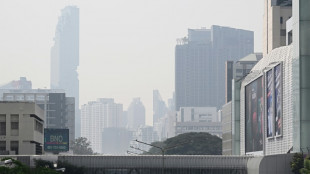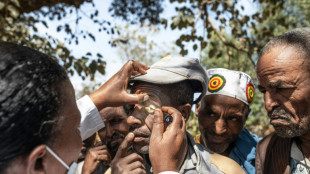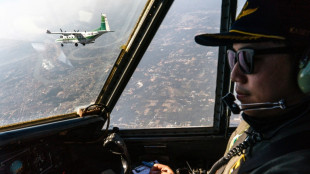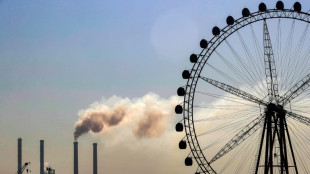| RYCEF | 1.72% | 7.55 | $ | |
| VOD | 0.13% | 8.411 | $ | |
| CMSC | -0.02% | 23.485 | $ | |
| RELX | -0.88% | 48.96 | $ | |
| RIO | 1.22% | 62.32 | $ | |
| SCS | -0.61% | 11.53 | $ | |
| NGG | -0.9% | 60.17 | $ | |
| RBGPF | -1.5% | 61.28 | $ | |
| GSK | -0.12% | 34.01 | $ | |
| BTI | 2.01% | 37.81 | $ | |
| AZN | 0.55% | 68.981 | $ | |
| CMSD | 0.04% | 23.88 | $ | |
| BP | 0.22% | 31.56 | $ | |
| JRI | 0.08% | 12.56 | $ | |
| BCC | -0.79% | 127.44 | $ | |
| BCE | 0.43% | 23.321 | $ |
Landmark US youth climate trial begins in Montana
The first ever constitutional climate trial in the United States opened Monday in Montana, brought by young activists suing the north-central state for violating their right to a "clean and healthful environment."
The case, Held v. Montana, is being closely watched as it could bolster similar proceedings across the country, with previous suits dismissed before being heard.
The 16 youths, ranging in age up to 22, said they have been harmed by the "dangerous impacts of fossil fuels and the climate crisis," with children "uniquely vulnerable" to its worsening impacts.
Lead plaintiff Rikki Held, whose family run a ranch in Montana, told the court in at times emotional testimony that their livelihoods and wellbeing had been increasingly impacted by wildfires, extreme temperatures and drought.
"I remember the wildfires burning 70 miles of power lines, so we lost electricity for about a month," resulting in cattle dying because ranchers couldn't pump water and because drought led to a shortage of grass, she said.
In 2021, smoke from wildfires choked the air "all summer," sending ash falling from the sky, triggering mass evacuations, and impacting the family's motel business, the 22-year-old environmental science graduate added.
At its heart is a provision within the fossil fuel friendly state's constitution that guarantees: "The state and each person shall maintain and improve a clean and healthful environment in Montana for present and future generations."
The plaintiffs are not seeking financial compensation, but rather a declaration that their rights are being violated.
- 'Betrayal' -
Specifically, they are challenging the constitutionality of a provision in the Montana Environmental Policy Act (MEPA), which prohibits government agencies from considering climate impacts when reviewing permitting applications from fossil fuel interests.
They are also suing to have equal rights as adults enforced under the Montana Constitution.
In his opening statement, advocate Roger Sullivan evoked the multiplying impacts of global warming on the state's youth.
These included "heat, drought, wildfires, air pollution, violent storms, loss of wildlife, watching glaciers melt," with medical and psychological impacts disproportionately impacting the young.
Moreover, the state had pursued a ruinous energy policy, releasing 166 million tonnes of carbon dioxide into the atmosphere annually, he added -- equivalent to the countries of Argentina, the Netherlands, or Pakistan.
The plaintiffs felt a sense of "betrayal," said Sullivan, with some expressing reluctance to have their own children because they fear the world they would grow up in.
For its part, the state had repeatedly tried but failed to have the case tossed out over procedural issues.
In opening remarks, Montana Assistant Attorney General Michael Russell said the court "will hear lots of emotion, lots of assumptions, accusations... and notably fear about what the future may hold, including sweeping and dramatic assertions of doom that awaits us all."
"Climate change is a global issue that effectively relegates Montana's role to that of a spectator," he added.
It comes as dozens of US jurisdictions are suing fossil fuel companies over climate impacts as well as disinformation campaigns about climate science.
- Climate science on trial -
The plaintiffs are represented by lawyers from Our Children's Trust, the Western Environmental Law Center and Roger Sullivan with McGarvey Law.
In a preview of the way arguments might shape up during the rest of the trial, the prosecution called eminent climate scientist Steve Running, now a professor emeritus at the University of Montana, to explain at length the scientific case for man-made warming.
Starting from first principles of the greenhouse effect, he worked his way to specific impacts on Montana, including shorter winters extending wildfire season, and causing formerly camouflaged snowshoe hares to stand out in their increasingly snow-free surroundings.
The defense's response, questioning the witness on how responsible Montana was, is a familiar line of attack, said Michael Burger, executive Director of the Sabin Center for Climate Change Law at Columbia University.
Governments and the fossil fuel industry "tend to say that... nothing should be done until everybody agrees to do everything, and that no individual contribution can be so big as to matter," he told AFP.
The case is being overseen by Judge Kathy Seeley in the state capital Helena, and will run until June 23.
R.Ryan--NG



